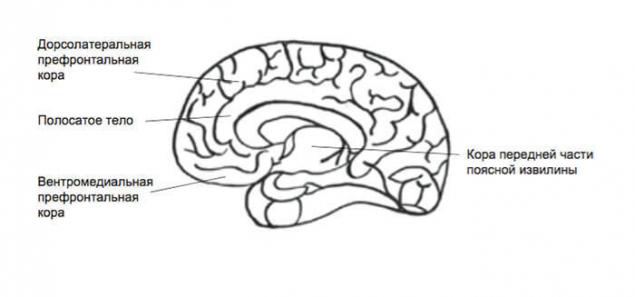915
André Aleman: Wisdom comes to us with age
In his book "The brain is a retired" professor of cognitive neuropsychology André Aleman talks about memory types, age-related changes in the brain and gives recommendations on how to maintain a sensible mind throughout life. We publish excerpts from the chapter devoted to the phenomenon of wisdom, its relationship to adulthood and psycho-physiological characteristics of the brain.

What is wisdom?
At all times, in every culture, there were people who perceived their own members as the wisdom keepers. Usually, they were gray old men, valued for their religious and philosophical knowledge and experience. They gave the rest of the answers on the main issues of life.
But how can a wise man, the brain cells that die off, and the level of attention and concentration is reduced? To answer this question we first need to define what is wisdom, and to track whether or not it comes with age. If so, we'll have to compare this with the observed changes in the brain.
The scientific approach always requires a definition. But because very difficult to determine exactly what is wisdom, researchers usually use different wording.
Perhaps now is give a definition: wisdom - the ability to understand complex situations, and thus form a correct behavior, the result of which will satisfy the largest possible number of people and lead to a positive result for all
. But this statement is not entirely satisfy us. To try to determine what people understand by wisdom, one researcher has developed a special questionnaire. He completed more than 2,000 readers of the magazine GEO. Many responses appeared: the ability to understand complex issues and relationships, knowledge and life experience, self-reflection and self-criticism, acceptance of interest and other human values, empathy and love for humanity, a desire to improve
. This understanding wisdom is typical for most people. American psychiatrists and Dilip Thomas Mix GEST added two more quality to this list: emotional stability and ability to make decisions in ambiguous situations. And finally, humor. Although it is usually not considered as an important component of wisdom, a sense of humor is a must for self - a necessary component of true wisdom
. Jeanne Calment of Louis, a Frenchwoman who has lived 122 years, distinguished wit. At its one-hundred twentieth birthday journalist, a few hesitant, expressed the hope that he will be able to congratulate her next year. "And why not, - said Kalman. - You look pretty
young. " Although for millennia, people have recognized the importance of wisdom, until recently, this concept is almost completely absent in the medical aging research. Perhaps because Western culture focuses on intelligence and therefore has managed to thoroughly examine the cognitive skills and logical thinking.
But the knowledge, skills and knowledge - not the same as wisdom, associated with a broader understanding of life and the ability to make choices in ambiguous situations, as well as to achieve a balance between such opposites as strength and weakness, doubt and confidence, dependence and independence , impermanence and infinity. We believe wise people, if they are able to give good advice in difficult circumstances, and their judgments are harmonious.
But the wisdom of the study should not limit people now living alone. We can see what is said about the wisdom of ancient treatises of different cultures. In most cases the question of religious texts.
The most famous example of Western culture - the Bible. In the Book of Proverbs wisdom is more valuable than precious metals or jewelry: "Does not wisdom call? Do not understanding raise her voice? Receive my instruction, and not silver; and knowledge rather than choice gold. For wisdom is better than rubies, and nothing you desire can compare with her. »
Long before Augustine's ancient Greek and Roman philosophers, who had a great influence on Western culture, attached great importance to wisdom. Sophocles (.. V century BC) wrote in "Antigone": "Wisdom - the highest good for us»
. Similarly, the Eastern culture for many centuries attached great importance to wisdom. Her idea of this concept has much in common with Western ideas. Bhagavad Gita, written in India around the V century BC. e., it is a major work of wisdom.
It considers wisdom as the totality of life events, the ability to manage emotions, to maintain self-control, love God, to sympathize, to be able to sacrifice - all this applies to the Western understanding of wisdom
. As a reason the elderly
Swiss psychologist Jean Piaget (1896-1980) made a significant contribution to our understanding of the cognitive development of children. He described the four phases, the last of which is the stage of 'formal operations ».
It usually starts at age 11 and moves into adulthood. A man at this stage of development is capable of logical reasoning and to solve abstract problems; in other words, he may submit logic solve and check them by trial and error. Wrong decisions are gradually eliminated, and what is left is right.
Behaviorism (English behavior -. Behavior) - the direction of psychology, which studies human behavior and ways of influencing it
. Based on Piaget's terminology, behaviorists introduced the concept of "postformal operations", including the uncertainty and flexibility of thinking and is used to describe the complex contradictory everyday tasks with different solutions.
In one experiment, participants from different age groups of students asked to solve the problem by rewriting the text in his work from Wikipedia. Student recognized that took entire paragraphs from Wikipedia, but to assert that she was not told that she had to give their sources, and did not explain how to do it.
Participants were asked how they would do in this case, as members of the examination committee. These students guidance clearly states that plagiarism - a serious violation for which a student may be expelled from the university. To find a solution, the subjects had to put yourself in the other person. And what was the result?
Most young people have decided that a student should be expelled. This is a consequence of formal operations described by Piaget. This conclusion seemed logical: the rule was broken, so shall be assessed the appropriate penalty
. Most elderly subjects resorted to postformal operations. Before you decide, you need to get more information. Is the student did not know the rules? How long she's learning? Was it clearly explained what is plagiarism? Depending on the answers to these questions are the elderly, probably came to the same conclusion as their younger counterparts, but they looked at the problem from the perspective of students and take into account the consequences of the fine.
The older, the wiser?
Is it true that with age we become wiser? Unfortunately, not all of us. At any age, there are people whose thoughts and actions can not be called wise, although this does not mean that they do not become wiser. The wisdom of life experience, our ups and downs. But it is very difficult to measure.
According to one study of German scientists, if you offer people challenges, and ask them for the best solutions, the majority of the elderly cope with this no better than middle-aged people. Interestingly, the elderly, as well as younger, better solve the problems that are typical for their age group.
In the experiment, some problems have attracted the attention of young people, and others - the elderly. An example of a problem for young people is the story of Michael, a 28-year-old mechanic, father of two young children, we learn that the factory where he works, will close in three months.
Michael can not find a suitable job there, where he lives. His wife - a nurse who had just received a well-paid job at a local hospital. Michael does not know whether they should move to another city, where he will find a job, or they should stay, and he will have to stay at home with children. Which solution is best for the next three to five years? What additional information is needed to make a decision?
An example of a problem for the elderly has become a dilemma Sarah, 60-year-old widow. After graduating from recent courses on personnel management, she opened the business, which had long dreamed of. However, her son recently lost his wife and was left with two small children. It may or liquidate the company and move to his son, to sit with their grandchildren, or help him pay for a babysitter. Which solution is better? What additional information is needed to solve the problem?
Elderly subjects (aged 60-81 years) with great enthusiasm solved the problem of Sarah, while a group of young people (25-35) offered good solutions for Michael. To obtain the title of "the wise", the participants had to list the different aspects of the problem, suggest several solutions to list the pros and cons, assess the risks, and, finally, to develop further action plans or to revise earlier decisions.
Some elderly people, as well as middle-aged people, will not engage in complex tasks that require specific solutions. This is due to the fact that this process involves a short-term memory and executive functions (eg, the ability to plan and sympathize).
Elderly eventually lost certain skills to come up with a number of difficult decisions and to compare them with each other. Although intact cognitive functions do not necessarily lead to wisdom, they really help in solving complex problems.
You may be wise, particularly in familiar situations, even if your mental abilities declined. But when faced with new challenges that require the processing of large amounts of information, the deterioration of short-term memory and cognitive flexibility, working against you.
Tortoise and the Hare
In 2004, the University of California, neuropsychologists have described a patient whom they named Phineas Gage of our time. This name refers to the railway workers of the XIX century, one of the most famous patient in the history of neuropsychology.
they received brain damage told us about the mysterious prefrontal cortex functions. In 1848, Gage was an accident: after the explosion metal rod entered the skull below the left eye socket and went out through the top. To the amazement of his colleagues, he survived and even out of the hospital only two months later.
But it has changed: in the words of his close friend, "Gage was no longer Gage. Although his ability to reason and observation and memory have not been damaged, his personality radically transformed. The man who used to be a hardworking, energetic and possess organizational skills, became impatient, foul-mouthed and unable to empathize. Gage could no longer assess the situation and was not able to control his emotions. He constantly had fits of anger, and he could not plan their actions. Reconstruction of the brain based on the preserved skull shows that the damage was the lower part of the prefrontal cortex.
Modern Phineas Gage, discovered in 2004, was damaged in 1962, when his jeep hit a mine during a military operation. The explosion of the metal frame of the windscreen broke his skull in the frontal part. As is the case with Gage, his mental capacity did not seem to have suffered.
His intellect was not damaged, and he showed good results on neuropsychological tests. However, in terms of social relations it turned out not so rosy. He showed disinhibited behavior and inability to control himself, which led to problems in the interaction with others. He lost his job, divorced his wife and stopped communicating with children.
According to a geriatric psychiatrist Dilip GEST, damage to the prefrontal cortex leads to the opposite of wisdom: impulsive, socially disapproved behavior and emotional clumsiness. Together with colleagues GEST for the first time mapped the brain regions responsible for wisdom. Scientists have attributed the important role of the prefrontal cortex.
Neuropsychologist Elhonon Goldberg describes a similar case in his book "The Paradox of wisdom." He considers the prefrontal cortex as a conductor, and the other parts of the brain - as an orchestra. The prefrontal cortex is not playing music, but coordinates, integrates and directs.
That is why people with damage to the prefrontal cortex is still capable of performing a variety of tasks, but face challenges in difficult situations, for example in the case of social contacts.
Goldberg also pointed out two other features of the prefrontal cortex. The first is our ability to empathize, the second - the ability to activate a sequence of actions, especially in difficult cases
. For example, if you are in for a long time been the leader, you will automatically know what steps should be taken in certain situations. Goldberg cites the example of Winston Churchill, who suffered from occasional mental mistakes that did not prevent him to be a great leader, even in quite a respectable age.

areas of the brain related to wisdom
By the wisdom of the four relevant part of the brain.
Firstly, it ventromedial prefrontal cortex is involved in emotional relationships and decision-making.
Second, the outer part of the prefrontal cortex (technically, the dorsolateral prefrontal cortex) responsible for rational thinking and determination of coping strategies.
Thirdly, the bark of the anterior cingulate, fixing conflicts of competing interests and dividing rational thinking and emotions.
And finally, located deep in the brain striatum, which is activated by stimuli associated with the reward.
Research has shown that older people are more focused on the awards, following the good decisions than on the negative consequences of errors. This means that they are focused on finding the right answers for more than preventing errors.
If you want to teach a 75-year-old man to use a computer, it is better to concentrate on what it does well, than to constantly point to mistakes or be reminded that any actions are performed differently.
A young man explaining a new job, you can simply say, "Come on, you're on the right track" - but with the elderly, this strategy does not work
. This is due to age-related changes in the functioning of the brain specific areas bark anterior cingulate responsible for error detection activated not so fast (in most people the number of gray cells with age is reduced), whereas the structure forming "bonus system" are unaffected.
Using EEG to measure electrical activity in the brain, a team of German researchers found that brain activity peak occurred in young adults and middle-aged people, when they were told that they made a mistake. This peak indicates the activity of the cortex anterior cingulate.
The higher the peak (and therefore higher activity of the brain), the faster the person studied mistakes. But in older subjects was much weaker than the peak of activity. Older people use different areas of the brain for learning, especially the prefrontal cortex, which plays an important role in memory. Although the function of this brain region also vary, many elderly people unable to benefit from it. They do this in part by mobilizing additional brain activity.
In general, older people have more difficulty with the new tasks than those in the solution which they use the accumulated knowledge based on personal experience. Good "database", created over the years, helping them to easily solve many everyday problems.
Dr. Oari Monchy from Montreal University, explaining the results of his studies of brain activity of older people, likes to refer to one of Aesop's fables. In the race between the tortoise and the hare beats the tortoise exactly, although it is much slower. She knows how to best use their abilities, while an arrogant hare during the race asleep.
Monchy and his colleagues asked the elderly and young people categorize words during an MRI procedure. Слова могли быть сгруппированы по рифме, по значению и по их первой букве, но исследователи постоянно изменяли правила, не сообщая об этом испытуемым.
Если классификация по рифме (стол — пол) была изначально правильна, то внезапно она становилась неверной, и испытуемым приходилось решать, должны ли они начать категоризировать по значению (пол — дом). Пожилые участники, в отличие от молодых, не показывали увеличения мозговой активности в ответ на негативный результат («Неправильно!»).
Однако они демонстрировали повышение мозговой активности, когда должны были делать новый выбор. То есть они больше вовлекались в продумывание новых стратегий выполнения задачи. А это более яркий отклик, чем простая реакция на предупреждение об ошибке.

What is wisdom?
At all times, in every culture, there were people who perceived their own members as the wisdom keepers. Usually, they were gray old men, valued for their religious and philosophical knowledge and experience. They gave the rest of the answers on the main issues of life.
But how can a wise man, the brain cells that die off, and the level of attention and concentration is reduced? To answer this question we first need to define what is wisdom, and to track whether or not it comes with age. If so, we'll have to compare this with the observed changes in the brain.
The scientific approach always requires a definition. But because very difficult to determine exactly what is wisdom, researchers usually use different wording.
Perhaps now is give a definition: wisdom - the ability to understand complex situations, and thus form a correct behavior, the result of which will satisfy the largest possible number of people and lead to a positive result for all
. But this statement is not entirely satisfy us. To try to determine what people understand by wisdom, one researcher has developed a special questionnaire. He completed more than 2,000 readers of the magazine GEO. Many responses appeared: the ability to understand complex issues and relationships, knowledge and life experience, self-reflection and self-criticism, acceptance of interest and other human values, empathy and love for humanity, a desire to improve
. This understanding wisdom is typical for most people. American psychiatrists and Dilip Thomas Mix GEST added two more quality to this list: emotional stability and ability to make decisions in ambiguous situations. And finally, humor. Although it is usually not considered as an important component of wisdom, a sense of humor is a must for self - a necessary component of true wisdom
. Jeanne Calment of Louis, a Frenchwoman who has lived 122 years, distinguished wit. At its one-hundred twentieth birthday journalist, a few hesitant, expressed the hope that he will be able to congratulate her next year. "And why not, - said Kalman. - You look pretty
young. " Although for millennia, people have recognized the importance of wisdom, until recently, this concept is almost completely absent in the medical aging research. Perhaps because Western culture focuses on intelligence and therefore has managed to thoroughly examine the cognitive skills and logical thinking.
But the knowledge, skills and knowledge - not the same as wisdom, associated with a broader understanding of life and the ability to make choices in ambiguous situations, as well as to achieve a balance between such opposites as strength and weakness, doubt and confidence, dependence and independence , impermanence and infinity. We believe wise people, if they are able to give good advice in difficult circumstances, and their judgments are harmonious.
But the wisdom of the study should not limit people now living alone. We can see what is said about the wisdom of ancient treatises of different cultures. In most cases the question of religious texts.
The most famous example of Western culture - the Bible. In the Book of Proverbs wisdom is more valuable than precious metals or jewelry: "Does not wisdom call? Do not understanding raise her voice? Receive my instruction, and not silver; and knowledge rather than choice gold. For wisdom is better than rubies, and nothing you desire can compare with her. »
Long before Augustine's ancient Greek and Roman philosophers, who had a great influence on Western culture, attached great importance to wisdom. Sophocles (.. V century BC) wrote in "Antigone": "Wisdom - the highest good for us»
. Similarly, the Eastern culture for many centuries attached great importance to wisdom. Her idea of this concept has much in common with Western ideas. Bhagavad Gita, written in India around the V century BC. e., it is a major work of wisdom.
It considers wisdom as the totality of life events, the ability to manage emotions, to maintain self-control, love God, to sympathize, to be able to sacrifice - all this applies to the Western understanding of wisdom
. As a reason the elderly
Swiss psychologist Jean Piaget (1896-1980) made a significant contribution to our understanding of the cognitive development of children. He described the four phases, the last of which is the stage of 'formal operations ».
It usually starts at age 11 and moves into adulthood. A man at this stage of development is capable of logical reasoning and to solve abstract problems; in other words, he may submit logic solve and check them by trial and error. Wrong decisions are gradually eliminated, and what is left is right.
Behaviorism (English behavior -. Behavior) - the direction of psychology, which studies human behavior and ways of influencing it
. Based on Piaget's terminology, behaviorists introduced the concept of "postformal operations", including the uncertainty and flexibility of thinking and is used to describe the complex contradictory everyday tasks with different solutions.
In one experiment, participants from different age groups of students asked to solve the problem by rewriting the text in his work from Wikipedia. Student recognized that took entire paragraphs from Wikipedia, but to assert that she was not told that she had to give their sources, and did not explain how to do it.
Participants were asked how they would do in this case, as members of the examination committee. These students guidance clearly states that plagiarism - a serious violation for which a student may be expelled from the university. To find a solution, the subjects had to put yourself in the other person. And what was the result?
Most young people have decided that a student should be expelled. This is a consequence of formal operations described by Piaget. This conclusion seemed logical: the rule was broken, so shall be assessed the appropriate penalty
. Most elderly subjects resorted to postformal operations. Before you decide, you need to get more information. Is the student did not know the rules? How long she's learning? Was it clearly explained what is plagiarism? Depending on the answers to these questions are the elderly, probably came to the same conclusion as their younger counterparts, but they looked at the problem from the perspective of students and take into account the consequences of the fine.
The older, the wiser?
Is it true that with age we become wiser? Unfortunately, not all of us. At any age, there are people whose thoughts and actions can not be called wise, although this does not mean that they do not become wiser. The wisdom of life experience, our ups and downs. But it is very difficult to measure.
According to one study of German scientists, if you offer people challenges, and ask them for the best solutions, the majority of the elderly cope with this no better than middle-aged people. Interestingly, the elderly, as well as younger, better solve the problems that are typical for their age group.
In the experiment, some problems have attracted the attention of young people, and others - the elderly. An example of a problem for young people is the story of Michael, a 28-year-old mechanic, father of two young children, we learn that the factory where he works, will close in three months.
Michael can not find a suitable job there, where he lives. His wife - a nurse who had just received a well-paid job at a local hospital. Michael does not know whether they should move to another city, where he will find a job, or they should stay, and he will have to stay at home with children. Which solution is best for the next three to five years? What additional information is needed to make a decision?
An example of a problem for the elderly has become a dilemma Sarah, 60-year-old widow. After graduating from recent courses on personnel management, she opened the business, which had long dreamed of. However, her son recently lost his wife and was left with two small children. It may or liquidate the company and move to his son, to sit with their grandchildren, or help him pay for a babysitter. Which solution is better? What additional information is needed to solve the problem?
Elderly subjects (aged 60-81 years) with great enthusiasm solved the problem of Sarah, while a group of young people (25-35) offered good solutions for Michael. To obtain the title of "the wise", the participants had to list the different aspects of the problem, suggest several solutions to list the pros and cons, assess the risks, and, finally, to develop further action plans or to revise earlier decisions.
Some elderly people, as well as middle-aged people, will not engage in complex tasks that require specific solutions. This is due to the fact that this process involves a short-term memory and executive functions (eg, the ability to plan and sympathize).
Elderly eventually lost certain skills to come up with a number of difficult decisions and to compare them with each other. Although intact cognitive functions do not necessarily lead to wisdom, they really help in solving complex problems.
You may be wise, particularly in familiar situations, even if your mental abilities declined. But when faced with new challenges that require the processing of large amounts of information, the deterioration of short-term memory and cognitive flexibility, working against you.
Tortoise and the Hare
In 2004, the University of California, neuropsychologists have described a patient whom they named Phineas Gage of our time. This name refers to the railway workers of the XIX century, one of the most famous patient in the history of neuropsychology.
they received brain damage told us about the mysterious prefrontal cortex functions. In 1848, Gage was an accident: after the explosion metal rod entered the skull below the left eye socket and went out through the top. To the amazement of his colleagues, he survived and even out of the hospital only two months later.
But it has changed: in the words of his close friend, "Gage was no longer Gage. Although his ability to reason and observation and memory have not been damaged, his personality radically transformed. The man who used to be a hardworking, energetic and possess organizational skills, became impatient, foul-mouthed and unable to empathize. Gage could no longer assess the situation and was not able to control his emotions. He constantly had fits of anger, and he could not plan their actions. Reconstruction of the brain based on the preserved skull shows that the damage was the lower part of the prefrontal cortex.
Modern Phineas Gage, discovered in 2004, was damaged in 1962, when his jeep hit a mine during a military operation. The explosion of the metal frame of the windscreen broke his skull in the frontal part. As is the case with Gage, his mental capacity did not seem to have suffered.
His intellect was not damaged, and he showed good results on neuropsychological tests. However, in terms of social relations it turned out not so rosy. He showed disinhibited behavior and inability to control himself, which led to problems in the interaction with others. He lost his job, divorced his wife and stopped communicating with children.
According to a geriatric psychiatrist Dilip GEST, damage to the prefrontal cortex leads to the opposite of wisdom: impulsive, socially disapproved behavior and emotional clumsiness. Together with colleagues GEST for the first time mapped the brain regions responsible for wisdom. Scientists have attributed the important role of the prefrontal cortex.
Neuropsychologist Elhonon Goldberg describes a similar case in his book "The Paradox of wisdom." He considers the prefrontal cortex as a conductor, and the other parts of the brain - as an orchestra. The prefrontal cortex is not playing music, but coordinates, integrates and directs.
That is why people with damage to the prefrontal cortex is still capable of performing a variety of tasks, but face challenges in difficult situations, for example in the case of social contacts.
Goldberg also pointed out two other features of the prefrontal cortex. The first is our ability to empathize, the second - the ability to activate a sequence of actions, especially in difficult cases
. For example, if you are in for a long time been the leader, you will automatically know what steps should be taken in certain situations. Goldberg cites the example of Winston Churchill, who suffered from occasional mental mistakes that did not prevent him to be a great leader, even in quite a respectable age.

areas of the brain related to wisdom
By the wisdom of the four relevant part of the brain.
Firstly, it ventromedial prefrontal cortex is involved in emotional relationships and decision-making.
Second, the outer part of the prefrontal cortex (technically, the dorsolateral prefrontal cortex) responsible for rational thinking and determination of coping strategies.
Thirdly, the bark of the anterior cingulate, fixing conflicts of competing interests and dividing rational thinking and emotions.
And finally, located deep in the brain striatum, which is activated by stimuli associated with the reward.
Research has shown that older people are more focused on the awards, following the good decisions than on the negative consequences of errors. This means that they are focused on finding the right answers for more than preventing errors.
If you want to teach a 75-year-old man to use a computer, it is better to concentrate on what it does well, than to constantly point to mistakes or be reminded that any actions are performed differently.
A young man explaining a new job, you can simply say, "Come on, you're on the right track" - but with the elderly, this strategy does not work
. This is due to age-related changes in the functioning of the brain specific areas bark anterior cingulate responsible for error detection activated not so fast (in most people the number of gray cells with age is reduced), whereas the structure forming "bonus system" are unaffected.
Using EEG to measure electrical activity in the brain, a team of German researchers found that brain activity peak occurred in young adults and middle-aged people, when they were told that they made a mistake. This peak indicates the activity of the cortex anterior cingulate.
The higher the peak (and therefore higher activity of the brain), the faster the person studied mistakes. But in older subjects was much weaker than the peak of activity. Older people use different areas of the brain for learning, especially the prefrontal cortex, which plays an important role in memory. Although the function of this brain region also vary, many elderly people unable to benefit from it. They do this in part by mobilizing additional brain activity.
In general, older people have more difficulty with the new tasks than those in the solution which they use the accumulated knowledge based on personal experience. Good "database", created over the years, helping them to easily solve many everyday problems.
Dr. Oari Monchy from Montreal University, explaining the results of his studies of brain activity of older people, likes to refer to one of Aesop's fables. In the race between the tortoise and the hare beats the tortoise exactly, although it is much slower. She knows how to best use their abilities, while an arrogant hare during the race asleep.
Monchy and his colleagues asked the elderly and young people categorize words during an MRI procedure. Слова могли быть сгруппированы по рифме, по значению и по их первой букве, но исследователи постоянно изменяли правила, не сообщая об этом испытуемым.
Если классификация по рифме (стол — пол) была изначально правильна, то внезапно она становилась неверной, и испытуемым приходилось решать, должны ли они начать категоризировать по значению (пол — дом). Пожилые участники, в отличие от молодых, не показывали увеличения мозговой активности в ответ на негативный результат («Неправильно!»).
Однако они демонстрировали повышение мозговой активности, когда должны были делать новый выбор. То есть они больше вовлекались в продумывание новых стратегий выполнения задачи. А это более яркий отклик, чем простая реакция на предупреждение об ошибке.
50 phrases that are sure to need to talk to your children!
Throughout his life with a good man who has a very different taste of happiness ...























